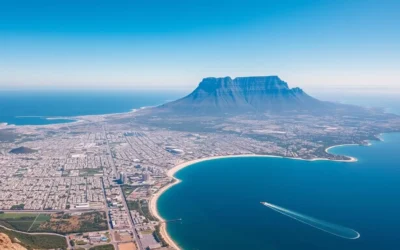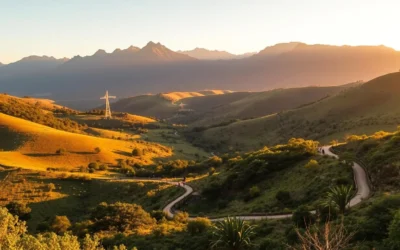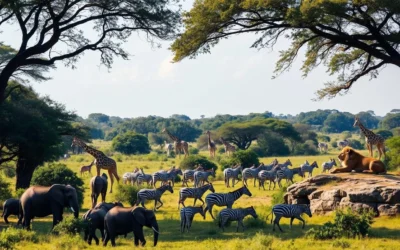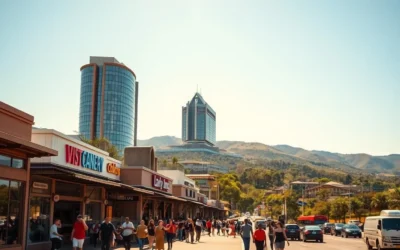✓ Accommodations✓ Flights✓ Rental Cars✓ Tours & Activities
Did you know this country is home to 12 official languages? This vibrant nation embraces a rich linguistic heritage, making it one of the most diverse places on Earth. Its constitution recognizes languages like Zulu, Xhosa, and Afrikaans, reflecting the multicultural fabric of its population.
From bustling cities to rural areas, people here often speak multiple languages. For example, Zulu is spoken by over 22% of the population at home, while English is used by nearly 10%. This multilingualism is a testament to the country’s complex history and cultural evolution.
In this article, you’ll explore how these languages shape daily life, from government to homes. You’ll also discover the indigenous tongues that preserve the nation’s heritage. Ready to dive into this fascinating linguistic journey? Let’s get started!
Understanding South Africa’s Unique Linguistic Landscape
Exploring the evolution of languages here reveals a story of resilience and identity. From colonial times to the present, the way people communicate has shaped the nation’s culture and history. This journey reflects the strength of its diverse population.
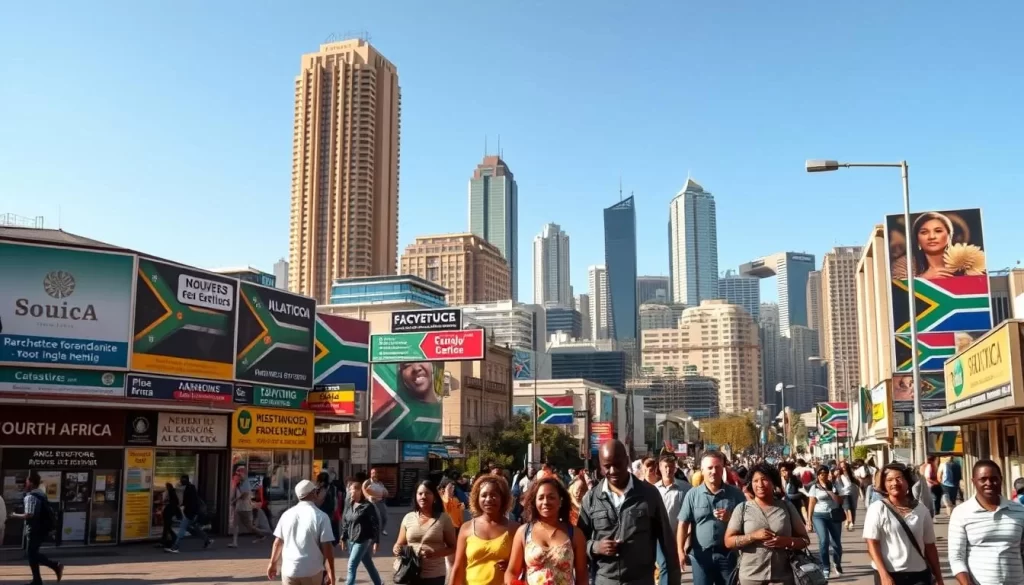
Historical Evolution from Colonialism to Modern Multilingualism
Colonial powers introduced Dutch and English, which became dominant during the 19th and 20th centuries. However, indigenous tongues like Zulu and Xhosa remained vital symbols of cultural pride. The apartheid era enforced language policies that marginalized many groups, but the post-1996 constitution recognized 11 official languages, ensuring representation for all communities.
Today, Zulu is spoken by 24% of the population, while Xhosa is used by 16%. Afrikaans, with roots in Dutch, is spoken by 12% of the population. This multilingualism is a testament to the nation’s ability to adapt and thrive despite its complex history.
How Language Shapes Identity and Culture
Language is more than a tool for communication; it’s a reflection of identity. In this country, people often mix languages in conversation, a practice known as code-switching. This blending shows how individuals navigate their cultural heritage in everyday life.
For example, English is widely used in government and business, while indigenous languages dominate homes and communities. This duality highlights the role of language in connecting different parts of society. It also underscores the importance of preserving linguistic diversity for future generations.
| Language | Percentage of Population |
|---|---|
| Zulu | 24% |
| Xhosa | 16% |
| Afrikaans | 12% |
| English | 9% |
Understanding this linguistic evolution is key to appreciating the nation’s modern identity. It’s a story of resilience, adaptation, and cultural pride that continues to shape everyday life.
South Africa: Official and widely spoken languages
The 12 official tongues reflect the country’s rich heritage. These languages are more than just communication tools; they are symbols of identity and cultural pride. Each one plays a unique role in shaping the nation’s social and political fabric.
An Overview of the 12 Official Languages
Zulu, spoken by 19.1 million people, is the most widely used language, especially in KwaZulu-Natal. Xhosa, with 17.2 million speakers, dominates the Eastern Cape. Afrikaans, rooted in Dutch, is prevalent in the Western Cape and beyond.
English serves as the primary language for business and government. Northern Sotho, Setswana, and Southern Sotho are also widely spoken, each with millions of speakers. Smaller groups like Tsonga, Swati, Venda, and Ndebele add to the linguistic mosaic.
Language Use in Public Life and Government
Public institutions adapt to this rich linguistic environment. For example, government documents are often available in multiple languages. Media outlets broadcast in various tongues to reach diverse audiences.
Multilingualism is a defining feature of society. Families often mix languages in daily conversations, reflecting their cultural heritage. This practice strengthens community bonds and preserves traditions.
| Language | Speakers (Millions) | Primary Region |
|---|---|---|
| Zulu | 19.1 | KwaZulu-Natal |
| Xhosa | 17.2 | Eastern Cape |
| Afrikaans | 15.9 | Western Cape |
| English | 13.8 | Nationwide |
The 1996 constitution played a crucial role in promoting linguistic equality. By recognizing 11 official languages, it ensured representation for all communities. This inclusivity remains a cornerstone of the nation’s identity.
Exploring Indigenous Languages and Multilingualism
Indigenous languages play a vital role in shaping everyday life and community bonds. They are more than just tools for communication; they are symbols of cultural pride and identity. Nearly 99% of black South Africans use these languages at home, ensuring their preservation for future generations.
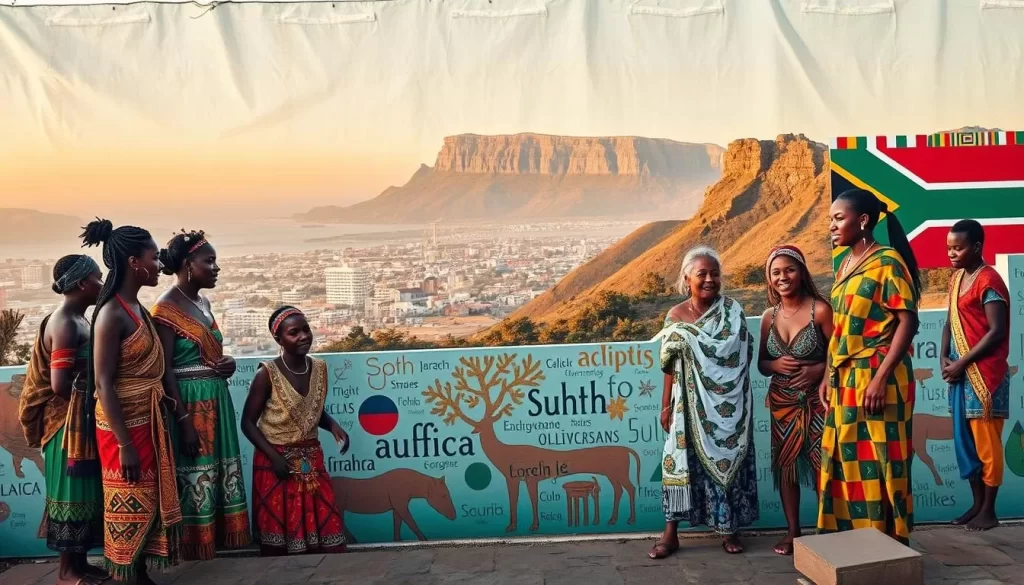
The Role of Indigenous Tongues in Daily Communication
In homes and local communities, indigenous languages foster strong connections. For example, Zulu is spoken by 25% of the population, while Xhosa is used by 16%. These languages are often mixed with English or Afrikaans in conversations, a practice known as code-switching. This blending reflects the multicultural identity of the nation.
Local radio stations and educational programs also prioritize indigenous languages. They help maintain cultural traditions and ensure that younger generations stay connected to their roots. This approach strengthens community ties and promotes inclusivity.
Embracing Multilingualism in a Diverse Society
Multilingualism is a defining feature of this society. It’s not just a cultural asset but also a practical tool in education and business. Schools encourage learning in multiple languages, which enhances cognitive development and cultural understanding.
In business, multilingual individuals often have an advantage. They can communicate effectively with diverse groups, fostering collaboration and innovation. This adaptability is a testament to the nation’s rich linguistic heritage.
- Community Ties: Indigenous languages strengthen bonds within families and neighborhoods.
- Education: Multilingual learning improves academic performance and cultural awareness.
- Business: Language diversity enhances communication and collaboration in the workplace.
Embracing multilingualism is central to the country’s social cohesion. It’s a celebration of diversity and a step toward a more inclusive future.
Regional Variations and Language Distribution in South Africa
Each province here has its own unique linguistic identity shaped by history and geography. From the Eastern Cape to the Western Cape, the way people communicate reflects their cultural roots and local traditions. This diversity is a testament to the nation’s rich heritage.
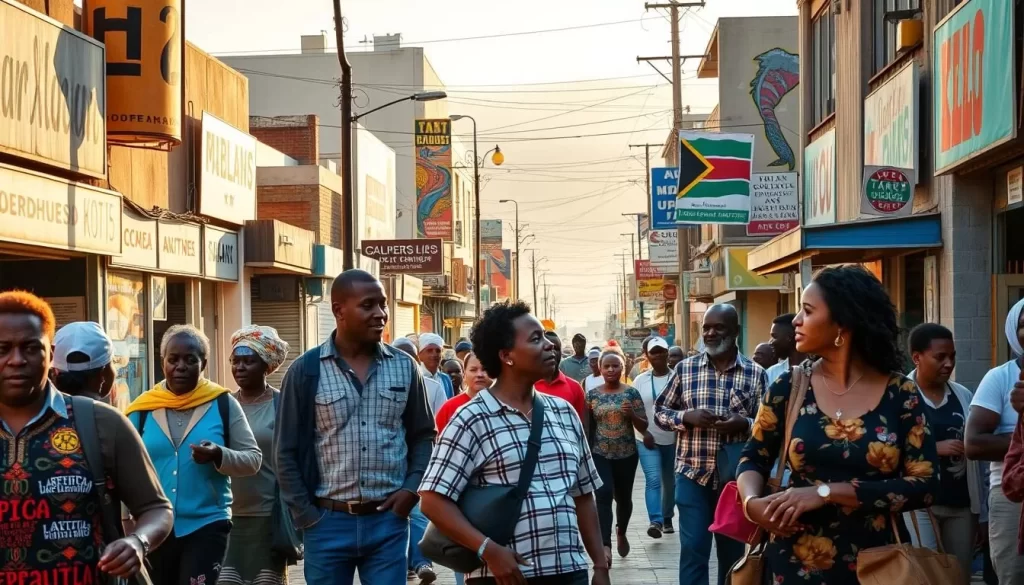
Provincial Language Trends and Demographics
In the Eastern Cape, isiXhosa dominates as the primary language, spoken by over 78% of the population. This reflects the region’s historical ties to the Xhosa people. Meanwhile, the Western Cape is known for its strong Afrikaans presence, with 49.7% of residents speaking it at home.
The Northern Cape also leans heavily toward Afrikaans, with 53.8% of its population using it daily. In contrast, urban areas like Gauteng showcase a mix of languages, with isiZulu, English, and Sesotho being the most common. This blend highlights the impact of migration and urbanization on language use.
Rural areas often preserve indigenous languages, while cities adopt more cosmopolitan linguistic practices. For example, English is widely used in business and education in urban centers, but indigenous languages remain vital in rural communities.
“Language is not just a means of communication; it’s a bridge to understanding cultural identity.”
Understanding these regional differences is crucial for businesses and policymakers. Companies targeting specific provinces must adapt their strategies to local linguistic preferences. Similarly, government programs need to consider language diversity to ensure inclusivity.
For instance, in the Eastern Cape, initiatives promoting isiXhosa in schools and media have strengthened cultural pride. In the Western Cape, Afrikaans remains a key part of public life, influencing everything from education to entertainment.
Demographic factors like population density and migration also play a role. Urban areas attract people from diverse backgrounds, creating a melting pot of languages. Rural regions, on the other hand, maintain traditional linguistic practices, preserving cultural heritage.
To explore more about language diversity in Gauteng, check out this detailed analysis. For a broader perspective on the nation’s linguistic landscape, visit this comprehensive guide.
Linguistic Origins, Colonial Influence, and Code-Switching
The linguistic landscape of this nation is deeply rooted in its colonial past and vibrant cultural exchanges. Colonial powers introduced European languages, which have since blended with indigenous tongues to create a unique linguistic identity. This mix reflects the resilience and adaptability of its people.
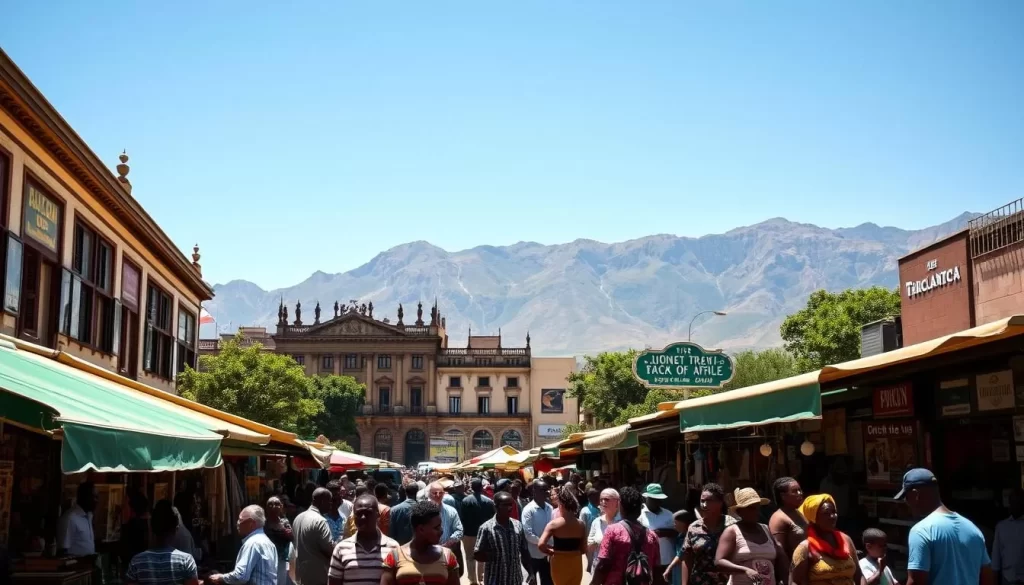
How Colonialism Shaped Modern Languages
Colonial policies established Dutch and English as dominant languages, marginalizing indigenous ones. Over time, Afrikaans evolved from Dutch, becoming a key language spoken by 13.5% of the population. English, introduced by British colonizers, is now used by 9.6% of the population.
These colonial languages influenced education and government, creating a divide between urban and rural areas. Urban centers adopted English for business and education, while rural regions preserved indigenous languages. This duality continues to shape the nation’s linguistic identity.
The Phenomenon of Code-Switching Among Speakers
Code-switching is a common practice here, where people mix languages in conversation. For example, many urban youth switch between English and their native tongues, reflecting their multicultural identity. This blending is especially prevalent in cities like Johannesburg and Cape Town.
In homes, families often use indigenous languages, while English or Afrikaans dominate public spaces. This practice strengthens cultural ties and ensures linguistic diversity thrives. It’s a testament to the nation’s ability to adapt and innovate.
“Language is not just a tool for communication; it’s a bridge to understanding cultural identity.”
Colonial influences and code-switching have created a dynamic linguistic environment. This blend of languages is a vital part of the nation’s heritage and future. To learn more about the interplay between language and culture, explore this detailed study.
Conclusion
The blend of languages in this nation tells a story of unity and diversity. With 12 official tongues, it reflects a rich cultural heritage. Zulu, spoken by 24% of the population, remains the most widely used, while Xhosa and Afrikaans follow closely. This linguistic mosaic shapes daily life, from homes to public spaces.
Historical influences, like colonialism, have left their mark. Yet, indigenous languages continue to thrive, preserving cultural identity. Many people effortlessly switch between languages, showcasing a deep-seated multicultural legacy. This adaptability is a testament to the nation’s resilience.
Understanding this linguistic diversity enriches your perspective on global multiculturalism. It’s not just a cultural treasure but also a practical asset in education and business. To delve deeper into this fascinating topic, explore this detailed study on language-based social preferences.
This dynamic blend of languages defines the nation’s character. It’s a celebration of diversity and a step toward a more inclusive future. Reflect on how this richness shapes identity and everyday interactions, and appreciate the unique linguistic tapestry that makes this country extraordinary.
The above is subject to change.
Check back often to TRAVEL.COM for the latest travel tips and deals.


